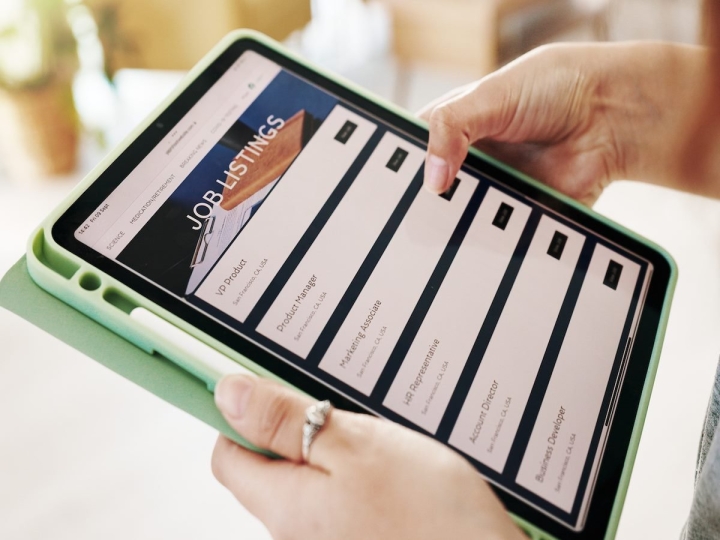
EditorialThe End of Job Boards? How AI Recruiting Is Changing the Game
While HR professionals have been using Applicant Tracking Systems (ATS) that incorporate AI for some time, AI recruiting is about to become a major actor in the job market — and possibly a disruptive force.
For some years now, massive job boards that promise to work for both job applicants and company recruiters have been the big players in the job search market. They make it easy for job seekers to apply to numerous openings, and for potential employers to identify candidates from a large pool. But Simon Oldham, CEO of AI recruitment software company QJumpers, thinks the big job board model is in trouble. As he sees it, job boards send too many applicants to employers, and the quality of those applicants is poor.
“It used to be that maybe 20% of applicants were a qualified fit for the job — now around 80% show as being qualified — but they are not. It is just AI making sure that they do fit the job.”
Traditional Job Boards Are Struggling in the Age of AI
Job boards don’t have the means to weed out those AI-tailored applications, which leaves hiring managers increasingly frustrated at the time they spend wading through a river of bad applicants, looking for those who might be qualified. The problem is made worse by the rise of AI agents that can mass-apply for thousands of jobs at once, flooding job boards with automated applications and overwhelming employers with sheer volume.
Oldham thinks AI recruiting software has the potential to make the job hunt much better for both applicants and employers. He draws a sharp line between AI Sourcing and AI Screening.
- AI Sourcing is about proactively finding and engaging top talent, especially passive candidates who aren’t applying but may be open to the right opportunity.
- AI Screening kicks in after applications arrive — but often struggles to filter out AI-generated résumés designed to game the system, regardless of actual qualifications.
The Benefits of AI Recruiting for Applicants and Employers
One benefit of AI recruiting software is the ability to target the passive candidate market — talented, qualified people who aren’t actively looking for a new job but would be open to the right offer. Passive candidates can be people already in the company, or anywhere in the world. AI automates the most time-intensive part of the process — scanning through possible candidate profiles on LinkedIn, GitHub and other career sites and sending out personalized communication. Recruiters can then focus their time on those with the most potential.
AI recruiting software may also be better at identifying prized soft skills, including good communication, teamwork, time management, self-discipline, adaptability and the willingness and ability to learn. Employers consistently prioritize these self-management skills over technical skills, as they know the latter can always be learned on the job. While it’s hard to glean those skills from a typical CV, AI software could be better at deciphering self-management skills from a job seeker’s background and employment history, and prioritizing applicants with those skills.
AI screening has benefits for applicants as well. They won’t be matched with jobs that don’t suit their skills, and they won’t be left hanging when employers never respond to their applications. AI software can notify them when they haven’t been matched, and can give personalized feedback on why, allowing them to refine their job hunt.
Balancing AI Recruiting Tools With Human Judgment
Of course, I don’t want to overlook potential problems with relying on AI for recruitment. One of the biggest issues is the possibility that AI acquires biases in its initial programming. An actual example of this type of bias occurred at Amazon, when its AI software, programmed only with the profiles of male engineers, automatically rejected female applicants. Apologies ensued and the software was withdrawn.
Another problem can occur when recruiters use AI as more than a screening tool, such as when companies use AI for initial job interviews. More than a few applicants have found themselves in a glitchy loop where the software bot asked irrelevant questions or the same question over and over. Often these candidates are left hanging after the failed interview, with no resolution or follow-up.
There seems to be a consensus in the field that AI recruiting works best not as a replacement for human interaction, but a supplement to it. AI can take on the repetitive, time-consuming tasks that weigh HR staff down, such as sorting through quantities of applications and sending out personal communication. AI also has the power to do more — recognize patterns, prioritize skills over job titles and identify those hard-to-spot self-management skills that employers value most. Freed from these tasks recruiters can spend their time much more productively, focusing on a finely honed list of truly qualified applicants.
The Future of Hiring Isn’t on a Job Board
Here’s the writing on the wall: Monster and CareerBuilder — two of the biggest job boards in history — have just gone into receivership. It’s not just a shakeup — it’s a signal. The old model of spray-and-pray job boards is collapsing under its own weight.
AI recruiting isn’t just a shiny new tool — it’s the reset button the industry has needed for years. Precision. Speed. Human-centered design. The future of hiring doesn’t look like a job board — it looks like something better.